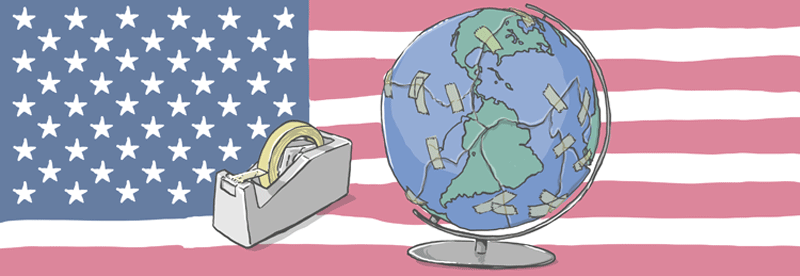
Even a Trump loss can’t save the old, post-1989 world order as we enjoyed it, says Alina Mungiu-Pippidi.
It’s never really the end of the world, you know? It’s just the end of the world as one knew it, of a certain world order that had been with one for a while. It can be for the better – I lived it in 1989 – or for the worse – people witnessed the takeover of Fascism in interwar Europe — or it may be uncertain. But most people feel when it’s coming. Afterwards, journalists put together books on how one spent the year before, or the summer before (have you also heard how great the summer of 1940 was, as often as I did these past months?), or even the week or the night before. And in ordinary conversation this becomes a benchmark and the source of innumerable personal anecdotes.
I am happy to report that I spent the week before working on a book on how to learn from virtuous circles in governance with precious few case studies, and watching Russia Today and Sky International. They are the least repetitive of all channels for news addicts, followed by France 24 and Al-Jazeera, but watching them comes at a cost (you are paying it by reading this blogpost). RT just showed me the infinite number of people in democratic countries who would cooperate against democracy just for their petty agendas, while Sky just aired to a maximum the anti-elite sentiment that has fueled Nigel Farage’s anti-Brexit campaign in the UK and Donald Trump’s campaign in the US alike.
These commentators claim the Western world order is just a weakening consensus among elites who make decisions on behalf of the people, not because they have more information – in the same way a driver needs to know traffic rules, or a surgeon needs to know anatomy, or more-informed people make better decisions than those who are out of touch – but because they are power hungry. The solution endorsed by many voters these days is to send this establishment packing, and with it judicial review, representative democracy and the rule of law, and to just give the people their full voice. And since there are many peoples and their voices might be rather divergent, and disentanglement is just not possible peacefully or in any other way in fact, the solution may be akin to a verse sung by one of my favourite recording artists: ”Let’s just entrust axes to the people/ So that each can sculpt in each.”
I have definitely been part as an adult of an imperfect quarter century of world order based on continuous and sophisticated exchanges, negotiations, bargaining and reciprocal checking, all framed by the overarching idea that in a world of global trade and global warming alike, some global governance is needed, simply because issues cut across peoples. The ‘elites’ or ‘technocrats’ managing this complexity – albeit poorly – were necessary simply for logistical reasons. Joint problems need joint government, they need the involvement of main actors and a lot of delegation of power from average citizens to knowledgeable people, who must be accountable, but remain a class apart.
The fury against this class has been unleashed and it’s like Caliban’s fury in Shakespeare’s The Tempest: it can smash all, but not the borders of its own understanding, not complexity itself, which will remain. The next quarter century risks seeing continents retiring, each in their own corner, and trying unsuccessfully to solve issues by themselves, in an Orwellian dystopia forged anew. Even if Trump loses narrowly and we manoeuvre the Brits out of Brexit, the old world order after 1989 cannot be saved as we enjoyed it. Populist delusions must be suffered in full before being discarded, with consequences such as those we currently see in Venezuela – before people are ready to turn a new page.
More about the author
-
Alina Mungiu-Pippidi, Professor of Democracy Studies
